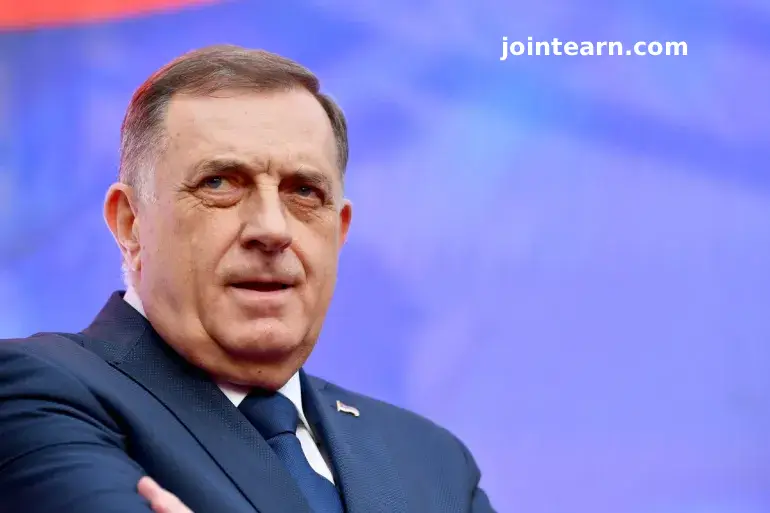
BANJA LUKA, Bosnia and Herzegovina — October 18, 2025 — Bosnia’s Serb-majority entity, Republika Srpska, has appointed Ana Trisic Babic as interim president, officially marking the temporary departure of long-time nationalist leader Milorad Dodik following his political ban by a state court.
The decision represents a pivotal moment for Bosnia’s fragile postwar politics, as Dodik — a dominant figure in Republika Srpska for more than two decades — faces mounting legal challenges and international isolation.
Ana Trisic Babic Named Interim Leader
The Republika Srpska National Assembly confirmed Babic’s appointment during an emergency session on Saturday, stating that she will serve until early presidential elections on November 23.
Babic, a seasoned diplomat and close Dodik ally, previously served as the entity’s deputy foreign minister and head of European integration. Her appointment was seen as an effort to maintain political continuity while complying with the state court’s ban on Dodik.
Lawmakers also annulled several controversial laws passed under Dodik that had directly challenged the authority of Bosnia’s Constitutional Court and Christian Schmidt, the international envoy overseeing implementation of the Dayton Peace Agreement.
Dodik Defiant Despite Ban
Despite being barred from holding public office for six years and sentenced to one year in prison by a Sarajevo court in February, Dodik has refused to accept the verdict, continuing to appear at official events and claim presidential authority.
The court convicted him for repeatedly defying decisions issued by the international high representative, who serves as the final arbiter in Bosnia’s complex political system.
In August, Bosnia’s Central Election Commission formally stripped Dodik of his mandate, citing the legal requirement to remove any official sentenced to more than six months in prison.
However, Dodik dismissed the ruling as “politically motivated,” insisting that only Republika Srpska’s institutions — not the state court or international envoy — can remove him from power.
International Sanctions and Political Fallout
Dodik remains under sanctions from the United States, the United Kingdom, and the European Union, accused of undermining Bosnia’s unity and threatening regional peace through his secessionist rhetoric.
The U.S. Department of the Treasury recently removed four Dodik associates from its sanctions list, a move that the Serb leader hailed as a “positive signal” in his campaign to have restrictions against himself lifted.
Washington, however, reiterated its stance that Dodik’s efforts to weaken the Dayton Accords — the 1995 peace deal that ended Bosnia’s civil war — remain unacceptable.
Background: Republika Srpska’s Separatist Push
Dodik’s political career has long been defined by his push for Republika Srpska’s autonomy and his threats to secede from Bosnia and Herzegovina.
Supported by Serbian President Aleksandar Vucic and Hungarian Prime Minister Viktor Orban, Dodik has deepened ties with Russia and opposed NATO integration, positioning himself as a defender of Serbian interests in the Balkans.
His defiance of international oversight — including declarations that Christian Schmidt’s authority “does not exist” in Republika Srpska — has raised concerns among Western diplomats of renewed instability in Bosnia, where ethnic divisions remain raw three decades after war.
The Dayton Framework and Current Challenges
Bosnia and Herzegovina continues to operate under the Dayton Peace Agreement, which established two semi-autonomous entities: Republika Srpska and the Bosniak-Croat Federation. These entities share central institutions, including a tripartite presidency, national judiciary, and armed forces.
While the system has maintained peace since 1995, critics say it has also entrenched ethnic divisions and made governance inefficient. Dodik’s repeated attempts to bypass state institutions and build parallel Serb-only structures have further tested the agreement’s limits.
With Babic’s interim presidency, Republika Srpska enters a politically uncertain period, as pro-Dodik forces seek to maintain control while facing growing domestic and international pressure for reform.
What Comes Next
The upcoming November 23 special election will determine whether Dodik’s influence continues through a loyal successor or whether moderate forces can mount a viable challenge.
Analysts say Babic’s interim leadership is likely to preserve the status quo, but her ability to manage internal divisions and maintain relations with Sarajevo and Western partners will be crucial in the coming weeks.
As Bosnia navigates this political transition, international observers stress the importance of upholding the rule of law and preserving the integrity of the Dayton Accords — seen as essential to preventing a return to ethnic conflict.


Leave a Reply